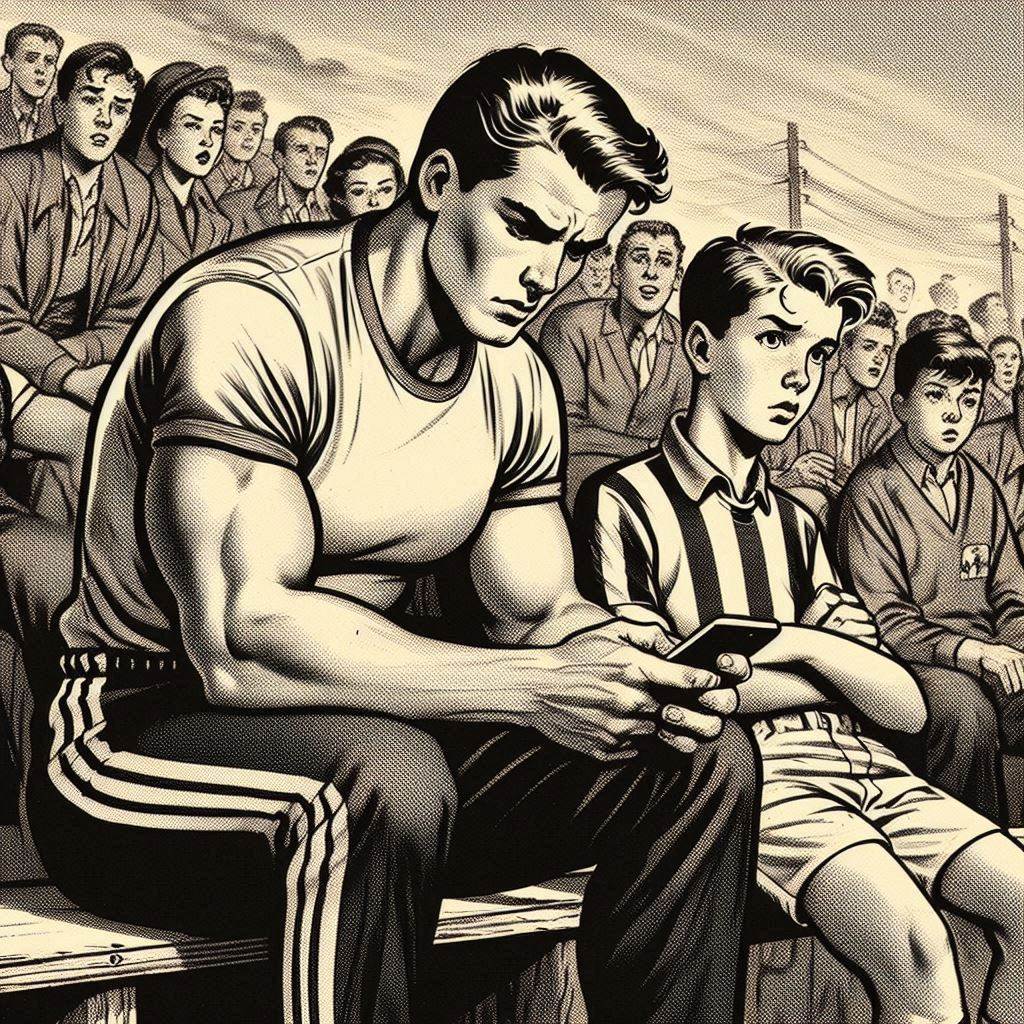This is a demo store for testing purposes — no orders shall be fulfilled. Dismiss
Skip to contentLET US AS FATHERS, BE WORTHY OF OUR SONS AND DAUGHTERS

Why Your Kid Needs More Than Just Your Body in the Room
If you’ve ever been to a kids’ sporting event or training session, you know the scene: parents lined up along the sidelines, but instead of watching the action, their heads are down, eyes glued to their phones. It’s become so normal that we barely notice it anymore. I have to be honest—I’ve never really been that dad. I’m notoriously disconnected from my phone and other devices, much to the frustration of my wife, friends and workmates. I’m not saying this to brag or suggest I’m better than anyone else. In fact, I often feel out of step with the modern world, and I know my habits can be annoying to those trying to reach me. But seeing those kids searching the sidelines for their parents’ attention, only to find them lost in their screens, always makes me sad.
Here’s the truth: being present and being present are two different things. Your kids notice when you’re distracted. And they remember.
It’s not just about missing a goal or a moment of pride. It’s about missing the chance to connect, to show your child that what they’re doing matters to you. I recently booked a ticket to my daughter’s orchestra concert. I was excited to see her play, to be there for her big moment. But as I sat down, I couldn’t help but notice the dad beside me. He was struggling—terribly overweight, wheezing with every breath. More than that, though, he had his phone balanced on his knee, scrolling through a sports betting app. The music swelled, kids played their hearts out, and this dad was miles away, lost in odds and scores.
It’s easy to judge, but the truth is, most parents are just trying to get through the day. Life is busy, and distractions are everywhere. Emails, work, social media, even sports betting—they all pull us away from the present moment. But the cost is real. Our kids grow up fast, and these moments—these games, concerts, dinners—are the building blocks of our relationship with them.
Kids crave connection. They want to know you’re interested in them, that you care about what they’re doing and who they’re becoming. When you’re distracted, they feel it—even if they don’t say it.
If this is happening in the big moments—sporting events, concerts, school plays—what’s happening in all the little moments that we might not think are as important? When was the last time you sat down for a tea party with your toddler, fully engaged in their imaginary world? Or kicked a ball around with your twelve-year-old, just for the fun of it? Have you ever joined your teenager for a workout, not just to supervise, but to actually participate and connect?
And if you have done these things, ask yourself: were you really present? Was your phone out of sight and out of mind, or were you checking notifications, answering emails, or scrolling through social media? The little moments matter just as much as the big ones. They’re the times when kids learn that they’re important, that their ideas and interests are worth your attention.
When you’re distracted, your child feels it. They might not say anything, but they notice. And over time, those missed moments add up. They learn that screens and distractions are more important than they are. They learn to expect less from you, to seek connection elsewhere.
But here’s the good news: it’s never too late to change. Start small. Put your phone away during meals or your kid’s events. Ask them about their day, their interests, their game. Show genuine interest in their answers. If you do get distracted, apologize and make an effort to reconnect. Kids are forgiving, especially when they see you trying.
The rewards are real. When you’re truly present, your child feels valued and loved. Your relationship grows stronger. You create memories that last a lifetime. And you set an example of how to be present in all areas of life.
So next time you’re at your kid’s game or concert, take a look around. Then put your phone away. Be there—really there—for your child. And don’t forget about the little moments, either. Whether it’s a tea party, a game of catch, or a workout with your teenager, those are the times when real connection happens. Because the moments you miss now are the ones you’ll wish you had back later.
Here are actionable steps any dad can take to be more present for his kids:
Being present isn’t about being perfect. It’s about making an effort, day by day, to show up for your kids—not just with your body, but with your attention and your heart.

I am a father of 5 wild and awesome kids. and the creator of the IRON FATHER. This is a blog about self reflection and fatherhood, and striving to become better. From one father to another, we can all seek improvment and forge ourselves into the legend that our kids deserve.

















IRON FATHER is a brand dedicated to empowering fathers to embrace their roles with strength, resilience, and active engagement in their children’s lives.
“Foundations are laid quietly. Those who are meant to find them will.”
© All Rights Reserved IRON FATHER 2024.